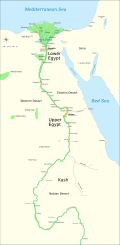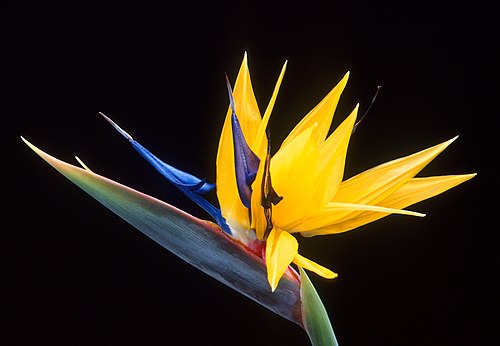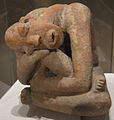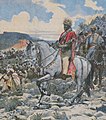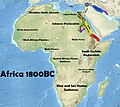Portal:Africa



Africa is the world's second largest and second-most populous continent after Asia. At about 30.3 million km2 (11.7 million square miles) including adjacent islands, it covers 20% of Earth's land area and 6% of its total surface area. With 1.4 billion people0 as of 2021, it accounts for about 18% of the world's human population. Africa's population is the youngest amongst all the continents; the median age in 2012 was 19.7, when the worldwide median age was 30.4. Despite a wide range of natural resources, Africa is the least wealthy continent per capita and second-least wealthy by total wealth, ahead of Oceania. Scholars have attributed this to different factors including geography, climate, lack of democracy, tribalism, corruption, colonialism, the Cold War, and neocolonialism. Despite this low concentration of wealth, recent economic expansion and the large and young population make Africa an important economic market in the broader global context.
Africa straddles the equator and the prime meridian. It is the only continent to stretch from the northern temperate to the southern temperate zones. The majority of the continent and its countries are in the Northern Hemisphere, with a substantial portion and a number of countries in the Southern Hemisphere. Most of the continent lies in the tropics, except for a large part of Western Sahara, Algeria, Libya and Egypt, the northern tip of Mauritania, and the entire territories of Morocco, Ceuta, Melilla, and Tunisia which in turn are located above the tropic of Cancer, in the northern temperate zone. In the other extreme of the continent, southern Namibia, southern Botswana, great parts of South Africa, the entire territories of Lesotho and Eswatini and the southern tips of Mozambique and Madagascar are located below the tropic of Capricorn, in the southern temperate zone.
Africa is highly biodiverse; it is the continent with the largest number of megafauna species, as it was least affected by the extinction of the Pleistocene megafauna. However, Africa also is heavily affected by a wide range of environmental issues, including desertification, deforestation, water scarcity and pollution. These entrenched environmental concerns are expected to worsen as climate change impacts Africa. The UN Intergovernmental Panel on Climate Change has identified Africa as the continent most vulnerable to climate change.
The history of Africa is long, complex, and varied, and has often been under-appreciated by the global historical community. Africa, particularly Eastern Africa, is widely accepted as the place of origin of humans and the Hominidae clade (great apes). The earliest hominids and their ancestors have been dated to around 7 million years ago, including Sahelanthropus tchadensis, Australopithecus africanus, A. afarensis, Homo erectus, H. habilis and H. ergaster—the earliest Homo sapiens (modern human) remains, found in Ethiopia, South Africa, and Morocco, date to circa 233,000, 259,000, and 300,000 years ago, respectively, and Homo sapiens is believed to have originated in Africa around 350,000–260,000 years ago. Africa is also considered by anthropologists to be the most genetically diverse continent as a result of being the longest inhabited. (Full article...)
Selected article –
The genetic history of North Africa encompasses the genetic history of the people of North Africa. The most important source of gene flow to North Africa from the Neolithic Era onwards was from Western Asia, while the Sahara desert to the south and the Mediterranean Sea to the North were also important barriers to gene flow from sub-Saharan Africa and parts of Europe in prehistory. However, North Africa is connected to Western Asia via the Isthmus of Suez and the Sinai peninsula, while at the Straits of Gibraltar, North Africa and Europe are separated by only 15 km (9 mi), similarly Malta, Sicily, Canary Islands, Lampedusa and Crete are close to the coasts of North Africa.
North Africa is a genetically heterogenous and diverse region, and is characterized by its diverse ethnic groups, the main ones being Arabs, Berbers and Copts (in Egypt). North African populations show a complex and heterogeneous genetic structure that has been described as an amalgam of at least four different ancestral components from the Middle East, sub-Saharan Africa, Europe and also indigenous North Africans who are distinct from these three. Although North Africa has experienced gene flows from the surrounding regions, it has also experienced long periods of genetic isolation. Some genetic studies have been criticised for their interpretation and categorisation of African genetic data. (Full article...)Featured pictures –
Did you know (auto-generated) -

- ... that Bill Pinkney was the first African American to sail around the world solo via the Cape of Good Hope and Cape Horn?
- ... that the first successful Mars rover, Sojourner, was named after the Civil War era African-American abolitionist and women's rights advocate Sojourner Truth?
- ... that the Indianapolis African-American community raised $100,000 in just ten days in 1911 to establish the Senate Avenue YMCA?
- ... that a 1939 thesis by Nathaniel Fadipe, The Sociology of the Yoruba, was the first sociological study by a black African?
- ... that Lea Ackermann, a German nun of the Missionary Sisters of Our Lady of Africa, fought against forced prostitution and sex tourism in East Africa?
- ... that African porters in Salvador, Bahia, went on strike after the provincial government passed a law requiring them to wear metal identification tags?
Categories
Selected biography –
Philibert Rabezoza (1923 – 29 September 2001), better known by the name Rakoto Frah, was a flautist and composer of traditional music of the central highlands of Madagascar. Born in 1923 near the capital city of Antananarivo to a poor rural family, Rakoto Frah surmounted the challenges posed by his underprivileged origins to become the most acclaimed 20th century performer of the sodina flute, one of the oldest traditional instruments on the island. Through frequent international concerts and music festival performances, he promoted the music of the highlands of Madagascar and became one of the most famous Malagasy artists, both within Madagascar and on the world music scene.
After gaining regional recognition for his sodina skills as a youth, Rakoto Frah rose to national fame in 1958 when he was selected by Malagasy President Philibert Tsiranana to perform on the sodina for the visiting French president Charles de Gaulle. This event launched his career as a professional musician. He first played at traditional ceremonies around the country, then expanded his performances from 1967 to include participation in international music competitions and festivals. His popularity declined in the 1970s but underwent a revival that began in the mid-1980s and continued until his death in 2001. During this period Rakoto Frah recorded ten albums, toured extensively in Madagascar and overseas, was featured in two French documentaries, and collaborated with a variety of international and Malagasy artists. Over the course of his career he recorded over 800 original compositions. Rakoto Frah and his sodina were depicted on the 200 ariary Malagasy banknote in honor of his key role in revitalizing and internationally popularizing the sodina. Despite the artist's worldwide acclaim, he lived simply and died having earned little from his lifetime of musicianship. His death was widely mourned and marked by a state funeral, and in 2011 a famadihana (the Malagasy highland "turning of the bones" funerary tradition) was organized to celebrate the artist's life. (Full article...)Selected country –
 |
 |
|

| ||
Angola, formally the Republic of Angola (Portuguese: República de Angola, pronounced [ʁɛˈpublikɐ dɨ ɐ̃ˈɡɔlɐ], Kongo: Repubilika ya Ngola), is a country in south-central Africa bordering Namibia to the south, the Democratic Republic of the Congo to the north, Zambia to the east, and the Atlantic Ocean to the west. The exclave province Cabinda also borders the Republic of the Congo to the north. At 481,321 mi² (1,246,700 km²), it is the world's twenty-third largest country.
A former Portuguese colony, it has considerable natural resources, among which oil and diamonds are the most significant. Angola's economy has undergone a period of transformation in recent years, moving from the disarray caused by the Angolan Civil War to being the fastest growing economy in Africa and one of the fastest in the world. Growth is almost entirely driven by rising oil production which surpassed 1.4 million barrels per day in late-2005 and which is expected to grow to 2 million barrels per day by 2007. (Read more...)
Selected city –
Enugu (/eɪˈnuːɡuː/ ay-NOO-goo; Igbo: Énugwú) is the capital city of Enugu State in Nigeria. It is located inland in the Southeastern part of Nigeria. In 2006, the city had a population of 820,000 according to the last Nigerian census.
The name Enugu is derived from the two Igbo words Énú úgwú, meaning "hill top", denoting the city's hilly geography. Enugu acquired township status in 1917 and was called Enugwu-Ngwo. Because of its rapid expansion towards areas owned by other indigenous communities, the city was renamed Enugu in 1928. Since the 17th century the location of present-day Enugu has been inhabited by the Enugwu-Ngwo and Nike (/niːˈkeɪ/ nee-KAY) subgroups of the Igbo people. (Full article...)In the news
- 12 February 2024 –
- Two boats collide on the Congo River near Kinshasa, Democratic Republic of the Congo; with the death toll remains unclear. (AP)
- 11 February 2024 – 2023 Africa Cup of Nations
- In association football, hosts Ivory Coast win their third Africa Cup of Nations by defeating Nigeria 2–1 in the final. Sébastien Haller scores the winning goal in the 81st minute. (The Guardian)
- 10 February 2024 – Somali civil war
- Four Emirati soldiers and a Bahraini military officer are killed, while ten other people are injured, when a soldier opens fire at a military base in Mogadishu, Somalia, before being killed in the ensuing shootout. Al-Shabaab claims responsibility. (AP)
- 10 February 2024 –
- A Eurocopter EC130 helicopter crashes near Nipton, California, United States, killing all the six people on board, including Nigerian banker Herbert Wigwe. (CBS News)
- 10 February 2024 – 2023–2024 Senegalese protests
- Violent protests occur in Senegal following an announcement by President Macky Sall that presidential elections have been delayed from February 25 to December 15. (Sky News)
- 9 February 2024 –
- At least 18 people are killed during a collision between a bus and a truck on a road in Kinshasa, Democratic Republic of the Congo. (AP)
Updated: 16:33, 14 February 2024
General images -
Africa topics
More did you know –
- ... that Safi Faye's 1975 film Kaddu Beykat was the first commercially distributed feature film made by a Sub-Saharan African woman?
- ... that legendary princess Yennenga, the "mother" of the Mossi people, was such a great warrior that her father refused to allow her to marry?
- ... that Safi Faye is a Senegalese film director whose work is better known in Europe than in her native Africa?
- ...that Mohamed Camara's 1997 film Dakan was the first West African film to explore homosexuality?
Related portals
Major Religions in Africa
North Africa
West Africa
Central Africa
East Africa
Southern Africa
Associated Wikimedia
The following Wikimedia Foundation sister projects provide more on this subject:
-
Commons
Free media repository -
Wikibooks
Free textbooks and manuals -
Wikidata
Free knowledge base -
Wikinews
Free-content news -
Wikiquote
Collection of quotations -
Wikisource
Free-content library -
Wikispecies
Directory of species -
Wikiversity
Free learning tools -
Wikivoyage
Free travel guide -
Wiktionary
Dictionary and thesaurus







